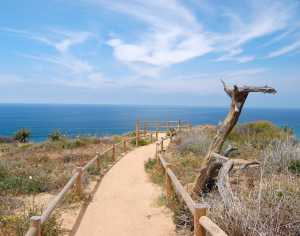While Government is an excellent machine to protect monopoly, has it ever been able to protect us against ill-disposed persons? … In establishing prisons into which multitudes of men, women, and children are thrown for a time in order to come forth infinitely worse than when they went in, does not the State maintain nurseries of vice at the expense of the tax-payers? …
On the other hand, if we analyse all the great advances made in this century – our international traffic, our industrial discoveries, our means of communication – do we find that we owe them to the State or to private enterprise? Look at the network of railways which cover Europe. At Madrid, for example, you take a ticket for St. Petersburg direct. You travel along railroads which have been constructed by millions of workers, set in motion by dozens of companies; your carriage is attached in turn to Spanish, French, Bavarian, and Russian locomotives: you travel without losing twenty minutes anywhere, and the two hundred francs which you paid in Madrid will be divided to a nicety among the companies which have combined to forward you to your destination. This line from Madrid to St. Petersburg has been constructed in small isolated branches which have been gradually connected, and direct trains are the result of an understanding which has been arrived at between twenty different companies. Of course there has been considerable friction at the outset, and at times some companies, influenced by an unenlightened egotism, have been unwilling to come to terms with the others; but, I ask, was it better to put up with this occasional friction, or to wait until some Bismarck, Napoleon, or Zengis Khan should have conquered Europe, traced the lines with a pair of compasses, and regulated the despatch of the trains? If the latter course had been adopted, we should still be in the days of stage-coaches.
The network of railways is the work of the human mind proceeding from the simple to the complex by the spontaneous efforts of the parties interested, and it is thus that all the great enterprises of our age have been undertaken. …
What thousands of examples one could cite in support of this same idea! Take all great enterprises such as the Suez Canal, the lines of Atlantic steamers, the telegraph which connects us with North and South America. Consider also that commercial organisation which enables you on rising in the morning to find bread at the baker’s … and all other things that you want at other shops. Is this the work of the State? …
If we closely scan the development of the human mind in our times we are struck by the number of associations which spring up to meet the varied requirement of the individual of our age – societies for study, for commerce, for pleasure and recreation …. To make a list of the associations which exist in Europe, volumes would be necessary, and it would be seen that there is not a single branch of human activity with which one or other does not concern itself. The State itself appeals to them in the discharge of its most important function – war; it says, “We undertake to slaughter, but we cannot take care of our victims; form a Red Cross Society to gather up the wounded on the battle. field and to take care of them.”
Let others, if they will, advocate industrial barracks, or the monastery of Authoritarian Communism; we declare that the tendency of society is in an opposite direction. We foresee millions and millions of groups freely constituting themselves for the satisfaction of all the varied needs of human beings – some of these groups organised by quarter, street, and house; others extending hands across the walls of cities, over frontiers and oceans.
Tag Archives | Anarchy
Radical Tea
Things that don’t exist, but should:

Left-Libertarians at Libertopia
[cross-posted at C4SS and BHL]
Next month (3-6 May) in San Diego I’ll be speaking at the Libertopia conference, which is back after several years’ hiatus. Here’s my topic and abstract:
Hoppean Libertarianism as Right-Wing Tribalism: A Critique
Roderick T. LongOne of the main conduits by which many libertarians in recent years have been drawn into the orbit of the Alt-Right is the work of Hans-Hermann Hoppe. I argue that Hoppe’s views on such matters as racial difference, immigration, monarchism, and the desirability of culturally homogeneous communities are systematically mistaken, as well as incompatible with a libertarian understanding of human action.

My Molinari Institute / Center for a Stateless Society / Alliance of the Libertarian Left / Bleeding Heart Libertarians colleague Gary Chartier will also be speaking; here’s his topic and abstract:
How to Think About the Constitution
Gary ChartierLibertarians often defend particular theories of constitutional interpretation. But, at least for those who are skeptical about standard defenses of state authority, there’s a prior question: are we obligated to follow the Constitution? If we’re not, I suggest, then there’s no right answer to questions about the right way to read the Constitution. Instead, we should make constitutional arguments likely to advance liberty.
Other speakers include David Friedman, Scott Horton, Jeff Tucker, Spencer MacCallum, and many more. Check it out!
Upcoming Panels: Marriage and Anarchy
[cross-posted at BHL]
Two Molinari/C4SS panels are coming up at two different conferences later this week:
1. The Molinari Society will be holding its mostly-annual Pacific Symposium in conjunction with the Pacific Division of the American Philosophical Association in San Diego, March 28-April 1, 2018. Here’s the schedule info:
Molinari Society symposium:
Author Meets Critics: Gary Chartier’s Public Practice, Private Law: An Essay on Love, Marriage, and the State
G9C. Friday, 30 March 2018, 7:00-10:00 p.m. (or so), Westin San Diego Gaslamp Quarter, 910 Broadway Circle, San Diego CA, room TBA
chair:
Roderick T. Long (Auburn University)critics:
Jennifer Lockhart (Auburn University)
Lori Watson (New Mexico State University)
Roderick T. Long (Auburn University)author:
Gary Chartier (La Sierra University)
2. We’ve also organised a panel at the Association of Private Enterprise Education conference in Las Vegas, April 1-4, 2018. Here’s the schedule info:
Topics in Free-Market Anarchism
4.A.6.. Wednesday, 4 April 2018, 8:00-9:15 a.m., Caesars Palace, 3570 Las Vegas Blvd S., Las Vegas NV, room TBA.
chair:
Roderick T. Long (Auburn University)panelists:
Gary Chartier (La Sierra University)
Jason Lee Byas (University of Illinois)
Nathan Goodman (George Mason University)
Roderick T. Long (Auburn University)
Nathan is also on a bunch of other panels; he’ll be speaking on “Social Capital and Social Justice: Why Liberalism is Essential” (Monday at 1:10 p.m.), “Voluntary Associations as an Alternative to State Social Welfare Provision” (Monday at 2:30 p.m.), “The Political Economy of Whistleblowers” (Tuesday at 8:00 a.m.), and “Policing, Civil Society, and External Aid: A Polycentric Perspective” (Tuesday at 2:30 p.m.).
In other news, for a brief report on the recent PPE Society meeting in New Orleans, see here.
To and Fro Upon the Earth
Last week I gave a talk on Lockean vs. Kantian takes on property rights in a state of nature at the PPE Society meeting in New Orleans. The conference had loads of libertarian academics; check out the participant list. Ann Cudd gave a keynote address criticising libertarians for being social atomists who don’t believe in any positive moral obligations; she seemed genuinely surprised that the assembled libertarians took exception to this characterisation. As a culminating irony she even offered, as a supposed critique of libertarianism, an analysis of Robinson Crusoe virtually identical to Bastiat’s.
(Incidentally, for anyone visiting New Orleans I highly recommend the shrimp and grits at Café Fleur de Lis and, as always, anything at Sukho Thai.)
Upon my return, I gave a talk on the relation between philosophical thought-experiments and fantastic fiction at the Auburn Philosophy Club’s panel on Fantasy, Fiction, and Philosophy here in Auburn.
Tomorrow I leave for gigs at the Pacific APA in San Diego and the APEE in Las Vegas; see the next post for details.
Then I’ll be coming back just in time for the Auburn Philosophy department’s conference on Practical Reasoning.
Like Noises in a Swound
I’m back from a Liberty Fund in San Diego (organised by Matt Zwolinski on Lysander Spooner). But I almost didn’t make it.

Ontological caution on display
I was scheduled to take the shuttle bus from Auburn to the Atlanta airport on Thursday morning. But on Wednesday I got a call from the bus company saying that thanks to the ice storm they were cancelling their Thursday morning trips – and all trips Wednesday as well. I contacted the local taxi company, who said that for a whopping fee they’d drive me to the airport, but only if we could leave right away (i.e., before they’d have to be driving in the dark, with colder temperatures and poorer visibility). So I frantically threw my clothes etc. into a suitcase, taking no time to shower, reserved a room for the night in Atlanta, and we were off. Between the traffic slowdowns, partial road closures, and sliding around on the ice, the trip to the airport took four hours (as opposed to the usual hour and forty-five minutes). Happily, all went properly the next morning.
Owing mainly to my mother’s final illness, when she couldn’t realistically be left alone overnight, I haven’t been on a plane for nearly two years. Incredibly, airplane bathrooms seem to have gotten even smaller in the interval, which I wouldn’t have thought possible. I can’t imagine how disabled passengers manage.

Torrey Pines Nature Reserve
I grabbed lunch at Las Cuatro Milpas, widely reputed to be the best Mexican eatery in the city. I thought the burrito was a bit dry, but the taco was incredible.
The conference on Spooner was great, and San Diego was lovely as usual. Being back there was a poignant reminder of what life is like where the airport is right in town rather than nearly two hours away, and nothing is ever shut down on account of an ice storm. The conference was at La Jolla’s Colonial Hotel, where my mother lived during the 1930s.
During a conference break I headed up to the Torrey Pines Nature Reserve, which I hadn’t seen since I was around eight or nine. Still as beautiful as ever.
Addendum:
I forgot to mention I also stopped by my old Ocean Beach neighbourhood and had lunch at Hodad’s.

